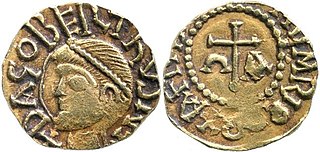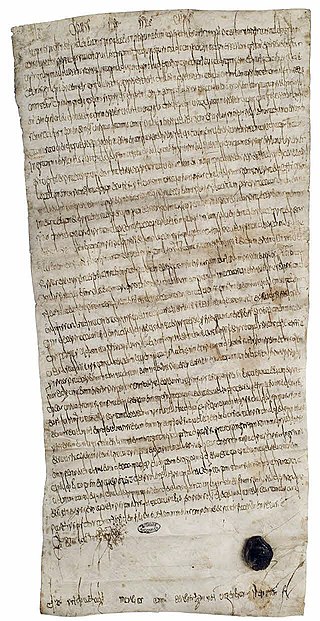Related Research Articles
Justus was the fourth archbishop of Canterbury. Pope Gregory the Great sent Justus from Italy to England on a mission to Christianise the Anglo-Saxons from their native paganism; he probably arrived with the second group of missionaries despatched in 601. Justus became the first bishop of Rochester in 604 and signed a letter to the Irish bishops urging the native Celtic church to adopt the Roman method of calculating the date of Easter. He attended a church council in Paris in 614.
Mellitus was the first bishop of London in the Saxon period, the third archbishop of Canterbury, and a member of the Gregorian mission sent to England to convert the Anglo-Saxons from their native paganism to Christianity. He arrived in 601 AD with a group of clergy sent to augment the mission, and was consecrated as Bishop of London in 604. Mellitus was the recipient of a famous letter from Pope Gregory I known as the Epistola ad Mellitum, preserved in a later work by the medieval chronicler Bede, which suggested the conversion of the Anglo-Saxons be undertaken gradually, integrating pagan rituals and customs. In 610, Mellitus returned to Italy to attend a council of bishops, and returned to England bearing papal letters to some of the missionaries.

Dagobert I was King of the Franks. He ruled Austrasia (623–634) and Neustria and Burgundy (629–639). He has been described as the last king of the Merovingian dynasty to wield real royal power, after which the Mayor of the palace rose as the political and war leader. Dagobert was the first Frankish king to be buried in the royal tombs at the Basilica of Saint-Denis.

Theodelinda also spelled Theudelinde, was a queen of the Lombards by marriage to two consecutive Lombard rulers, Autari and then Agilulf, and regent of Lombardia during the minority of her son Adaloald, and co-regent when he reached majority, from 616 to 626. For well over thirty years, she exercised influence across the Lombard realm, which comprised most of Italy between the Apennines and the Alps. Born a Frankish Catholic, she convinced her first spouse Autari to convert from pagan beliefs to Christianity.

Childeric III was King of the Franks from 743 until he was deposed in 751 by Pepin the Short. He was the last Frankish king from the Merovingian dynasty. Once Childeric was deposed, Pepin became king, initiating the Carolingian dynasty.

Clovis IV was the king of the Franks from 690 or 691 until his death. If the brief reign of Clovis III (675) is ignored as a usurpation, then Clovis IV may be numbered Clovis III.

Rosamond Deborah McKitterick is an English medieval historian. She is an expert on the Frankish kingdoms in the eighth and ninth centuries AD, who uses palaeographical and manuscript studies to illuminate aspects of the political, cultural, intellectual, religious, and social history of the Early Middle Ages. From 1999 until 2016 she was Professor of Medieval History and director of research at the University of Cambridge. She is a Fellow of Sidney Sussex College and Professor Emerita of Medieval History in the University of Cambridge.

Charibert II, a son of Clotaire II and his junior wife Sichilde, was briefly King of Aquitaine from 629 to his death, with his capital at Toulouse. There are no direct statements about when Charibert was born exactly, the only known fact being that he was "a few years younger" than his half-brother Dagobert. His father Clotaire evidently had a bigamous marriage and he was the offspring of the junior wife.

Liuvigild, Leuvigild, Leovigild, or Leovigildo, was a Visigothic King of Hispania and Septimania from 567 to 586. Known for his Codex Revisus or Code of Leovigild, a law allowing equal rights between the Visigothic and Hispano-Roman population, his kingdom covered modern Portugal and most of modern Spain down to Toledo. Liuvigild ranks among the greatest Visigothic kings of the Arian period.
John Michael Wallace-Hadrill, was a British academic and one of the foremost historians of the early Merovingian period.

The Chronicle of Fredegar is the conventional title used for a 7th-century Frankish chronicle that was probably written in Burgundy. The author is unknown and the attribution to Fredegar dates only from the 16th century.
Waiofar, also spelled Waifar, Waifer or Waiffre, was the last independent Duke of Aquitaine from 745 to 768. He peacefully succeeded his father, Hunald I, after the latter entered a monastery. He also inherited the conflict with the rising Carolingian family and its leader, Pepin the Short, who was king of the Franks after 751 and thus Waiofar's nominal suzerain.

The Battle of Tertry was an important engagement in Merovingian Gaul between the forces of Austrasia under Pepin II on one side and those of Neustria and Burgundy on the other. It took place in 687 at Tertry, Somme, and the battle is presented as an heroic account in the Annales mettenses priores. After achieving victory on the battlefield at Tertry, the Austrasians dictated the political future of the Neustrians.
Lupo II is the third-attested historical Duke of Gascony, appearing in history for the first time in 769. His ancestry is subject to scholarly debate.
The pagan religion of the Germanic tribal confederation of the Franks has been traced from its roots in polytheistic Germanic paganism through to the incorporation of Greco-Roman components in the Early Middle Ages. This religion flourished among the Franks until the conversion of the Merovingian king Clovis I to Nicene Christianity, though there were many Frankish Christians before that. After Clovis I, Frankish paganism was gradually replaced by the process of Christianisation, but there were still pagans in the late 7th century.
Charles Patrick Wormald was a British historian born in Neston, Cheshire, son of historian Brian Wormald.
Neil Christie is a British archaeologist and historian. He is professor of archaeology at the University of Leicester.

Suintila, or Suinthila, Swinthila, Svinthila; was Visigothic King of Hispania, Septimania and Galicia from 621 to 631. He was a son of Reccared I and his wife Bado, and a brother of the general Geila. Under Suintila there was an unprecedented peace and unity across the Kingdom of the Visigoths. As a direct result, by 624 the king was able to muster the forces necessary to retake those lands that had been under the control of the Eastern Roman Empire.
Michael Lapidge, FBA is a scholar in the field of Medieval Latin literature, particularly that composed in Anglo-Saxon England during the period 600–1100 AD; he is an emeritus Fellow of Clare College, Cambridge, a Fellow of the British Academy, and winner of the 2009 Sir Israel Gollancz Prize.
The Battle of Autun was a pitched battle in 642 or 643, concluding a feud between Flaochad and Willebad, two magnates of the Merovingian kingdom of Burgundy. The battle is recounted in detail in the final chapter of the contemporary Chronicle of Fredegar and also in the biographies of saints Eligius of Noyon and Sigiramn. While Fredegar seems hostile to Willebad, the hagiographers are hostile to Flaochad. The anonymous author of Fredegar may have been an eyewitness.